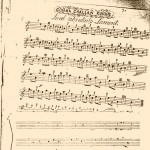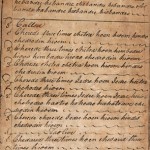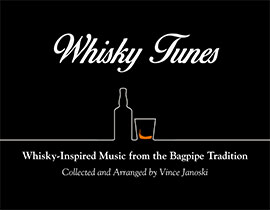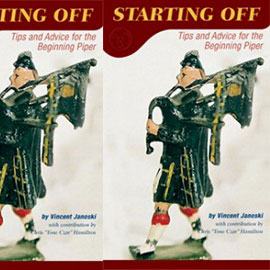5 Tips to Get You Searching Bagpipe Tunes With Purpose
 We pipers love the latest and greatest music produced by our favorite soloists and pipe bands, don’t we? We want to play the same exciting stuff we hear. This impulse inevitably leads us on a search for the scores of said tunes. Unfortunately, these half-hearted searches lead many to internet forums asking others where it came from or requesting the score directly. While the impulse is to be commended (the desire to expand your repertoire is a great impulse), these folks are going about it the wrong way.
We pipers love the latest and greatest music produced by our favorite soloists and pipe bands, don’t we? We want to play the same exciting stuff we hear. This impulse inevitably leads us on a search for the scores of said tunes. Unfortunately, these half-hearted searches lead many to internet forums asking others where it came from or requesting the score directly. While the impulse is to be commended (the desire to expand your repertoire is a great impulse), these folks are going about it the wrong way.
Internet forums are where good bagpiping knowledge goes to die. It’s kind of like walking into a barn full of hungry starlings and tossing a crust of bread on the ground. What happens next is not something that should make you stick around. You may or may not find the answers you’re looking for and you will only end up covered in poop. Forums cast the illusion of being a convenient place to get quick answers but the truth is quite the opposite. It always will take a lot more work to determine who is right and who is wrong, separate good info from bad. And whatever transcription or score you manage to uncover has murky origins at best and is more likely than not a corrupted mess.
Why do that to yourself? If you’ve heard the tune, and possess the CD or track, then you have all the information you need to track down the tune and/or book by yourself, no forum critters to get in your way. Finding the source and purchasing the book to add to your library is more valuable in the long run than the immediate gratification of receiving a single piece of sheet music of questionable origins by email.
One imagines that, if someone is posting on an internet forum, then they have access to a computer and the internet. With that, you have everything you need to find what you’re looking for. Here are five easy tips to search bagpipe tunes with clear purpose and an eye toward the ultimate prize—possessing the actual score from its source.
Tip 1. Liner notes. Here is where we make the case for buying physical CDs and not downloading digital tracks. With bagpiping CDs and pipe band albums, the liner notes are the most important thing in the package. Most albums you download off of iTunes do not contain the CD insert or liner notes, which is a source of frustration and annoyance (and for me, outright anger!). It is that piece of paper that is going to steer you in the right direction when seeking out tunes. The tracks listed on the liner notes will inevitably list all the tune titles played along with their composers. Find the tune, find the composer’s name. If the tune is “traditional,” that will be noted as well.
Tip 2. Your library. The first step you should take after learning the tune title and/or composer’s name is to search the index or contents of the books you have in your library. What’s that? You don’t have any tune books? Then shame on you. The larger your library, the more likely it is your search will be over right now. Even if you have only a handful of books, they should still be the first place you look. The more well known collections are still the source material for much of the music played by soloists and champion pipe bands today. Start yourself off with Donald MacLeod’s books and you will never want for tunes.
Tip 3. Google it. If the composer is still unknown, one google search of the tune title should turn up all sorts of things. Improve your “search fu” and add the word “bagpipes” to the search. Much of the time, YouTube video of some band or musician playing the tune will pop up. Sometimes you will uncover other CDs where the tune appears. If you are googling the composer, you will likely find a link to the book of tunes it came from. Some bagpipe supply houses list the table of contents of the books they stock, allowing your google search to be that much more accurate. Pull out your credit card and your search is over.
Tip 4. Trust it. A published tune is a known thing and can be accessed by several excellent tune databases out on the internet. The site Pipetunesearch.org set up some time ago by Henri Aanstoot is an invaluable tool for searching published tunes and finding their source. The books that form the source for the tool are a constantly growing list of new and old publications that should give any piper looking to expand their repertoire the information they need. You don’t even need to know the title. An added feature of the tool allows input of the first few notes to seek out the tune. Once you’ve done that and you know the title and the composer and the source (and you still resist the good sense to purchase the full source book) it is a short click to two sites where you are sure to find trusted typeset scores. Jim McGillivray’s Pipetunes.ca and the music library over at Jack Lee’s Lee & Sons website are two excellent places to seek out and purchase vetted scores of individual tunes prepared by recognized master pipers. A quick search on those sites would not be wasted effort. What they lack in scope they make up for in diversity.
Tip 5. Network. But what if the tune is very modern and perhaps unpublished, you ask? You will learn this very quickly when your google search comes up empty. Your task then becomes tracking down the folks who play it and simply asking them about it. Sometimes it is a question of being bold and emailing the piper or band in question and asking the question, “Who composed [insert tune title here]?” Never underestimate the generosity of expert musicians. The majority are going to be thrilled to share. You might need to network your way through a few people to get the contact information you desire but, the extra effort is worth it. This is your music we’re talking about.
 Pipehacker
Pipehacker







